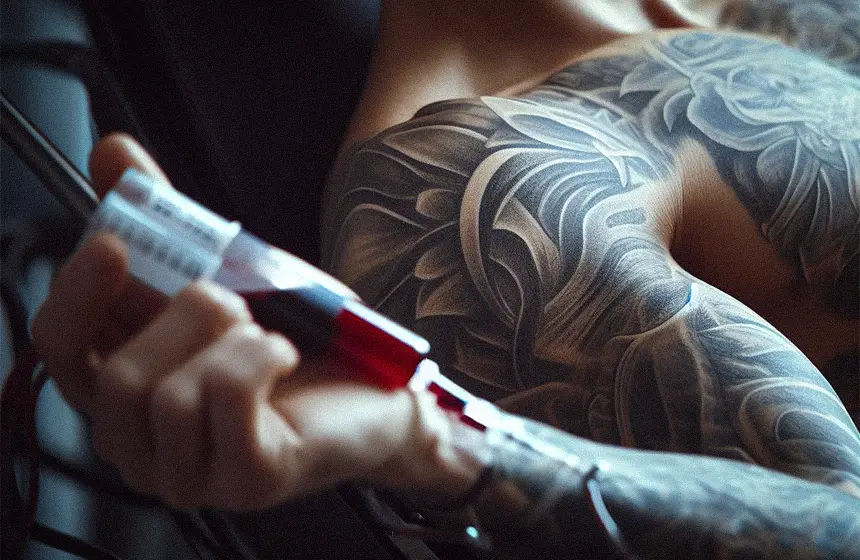Can you donate plasma if you have tattoos?
It’s not as simple as you might think.
Let’s cut through the fog and dive into FDA guidelines, risks with unregulated shops, and how piercings could play a part.
Before you flex that tattooed arm for a good cause, let’s explore this complex issue together.
Table of Contents
Can You Donate Plasma if You Have Tattoos?

Yes, you can! If you recently got a piercing or a tattoo, it’s a good idea to wait for about four months before donating plasma.
After waiting, a doctor will check your blood to ensure it’s okay, and if everything looks good, you can donate again.
Tattoo and Blood Donation
If you’ve recently gotten a tattoo, it’s crucial to understand how it might affect your eligibility to donate blood or plasma. Tattoo infection risks are a genuine concern; unregulated shops can’t guarantee safety standards, potentially leading to blood contamination.
You’ll need to wait at least three months post-tattoo to donate, ensuring your blood is safe and infection-free. In the spirit of innovation, consider state-regulated tattoo shops. They uphold strict health standards, reduce infection risks, and may allow you to donate earlier.
The importance of blood safety in donation processes can’t be overstated. It’s not just about you but also about the recipients of your donation.
Donating After Unregulated Tattooing
When you get a tattoo at an unregulated shop, you must know that you cannot donate blood for at least three months. This caution comes due to the risks of unregulated tattooing, primarily the increased chances of bloodborne infections.
The importance of state regulations in this context can’t be overstated. State-regulated places uphold strict safety and hygiene standards, reducing infection risks. However, not all states require tattoo shop regulation, so it’s crucial to be aware of local laws.
While unconventional or spontaneous tattooing may be tempting, prioritize your health. Weigh the potential novelty against the significant risk to not only your ability to donate blood but also your overall health.
Piercing’s Impact on Blood Donations
Just like tattoos, your ability to donate blood can also be affected by piercings. Piercing safety plays a crucial role in this.
If done in a non-sterile environment, piercings can introduce foreign substances and bloodborne pathogens like hepatitis B, hepatitis C, and even HIV into your system. This increases the risk of blood contamination, making you ineligible to donate for at least three months.
State regulations are also a factor. Some states allow blood donations if the piercing was done using single-use equipment in a state-regulated facility. But if you need more clarification about the safety of the equipment used or the piercing shop wasn’t state-regulated, you must wait three months before donating.
Always prioritize safety when it comes to body modifications to ensure eligibility for blood donations.
Additional Factors Affecting Eligibility
While considering whether your tattoos or piercings may affect your ability to donate plasma, it’s also important to remember that other health conditions and lifestyle factors can impact your eligibility, too.
Tattoo aftercare and its impact on blood donation are crucial. After getting a tattoo, it’s vital to ensure proper aftercare to reduce the risk of infection that could hamper your ability to donate.
The role of state regulations in ensuring safe tattooing for blood donors is vital. If you’ve gotten your tattoo from a state-regulated shop, you’re less likely to face eligibility issues.
However, conditions like persistent high or low blood pressure, recent travels, or certain infections might temporarily halt your donation plans.
Always check with your local blood centre to get accurate information.
Basic Requirements for Blood Donation
Before you decide to roll up your sleeves and donate, you must meet the basic requirements for blood donation. Let’s explore these requirements alongside tattooing regulations and blood donation eligibility.
| Requirement | Criteria | Notes |
|---|---|---|
| Age | 17+ (16 with parental consent in some states) | Age limits apply |
| Weight | At least 110 lbs | Ensures your body can handle the blood loss |
| Health Status | Not anaemic, average body temperature | Protects your health and ensures the quality of the donation |
Frequently Asked Questions
-
Can I Donate Plasma if I Have a Tattoo From a Non-State-Regulated Shop?
Ink allergies don’t typically affect plasma donation. However, suppose you’ve gotten a tattoo from an unregulated shop. In that case, you’re at risk for infections, so you must wait three months before donating plasma.
-
How Long Should I Wait to Donate Plasma After Getting a New Piercing?
Ink allergies don’t typically affect plasma donation. However, suppose you’ve gotten a tattoo from an unregulated shop. In that case, you’re at risk for infections, so you must wait three months before donating plasma.
-
How Does a Recent Tattoo or Piercing Affect My Plasma Donation Eligibility?
Yes, you can donate plasma, even with tattoos. However, ink allergies could affect plasma quality. It’s best to wait at least 3 months after getting a new tattoo to ensure safety and quality.
-
If I Got a Tattoo or Piercing in a State That Does Not Require Regulation, Can I Still Donate Plasma?
If you’ve been inked or pierced in unregulated states, there’s a risk. The correlation between tattoos and plasma donation is clear: a waiting period is required to ensure no bloodborne diseases affect your donation.
Conclusion
So, can you donate plasma with tattoos?
Yes, but it depends on where you got inked and your state’s regulations. Unregulated tattooing can pose risks, while piercings may also influence your eligibility. Other factors like health conditions could also come into play.
It’s crucial to check with your local donation centre about their specific rules.
Remember, your desire to donate is commendable, but safety should always be the primary concern.
sources: https://www.healthline.com/health/can-you-donate-blood-if-you-have-a-tattoo





